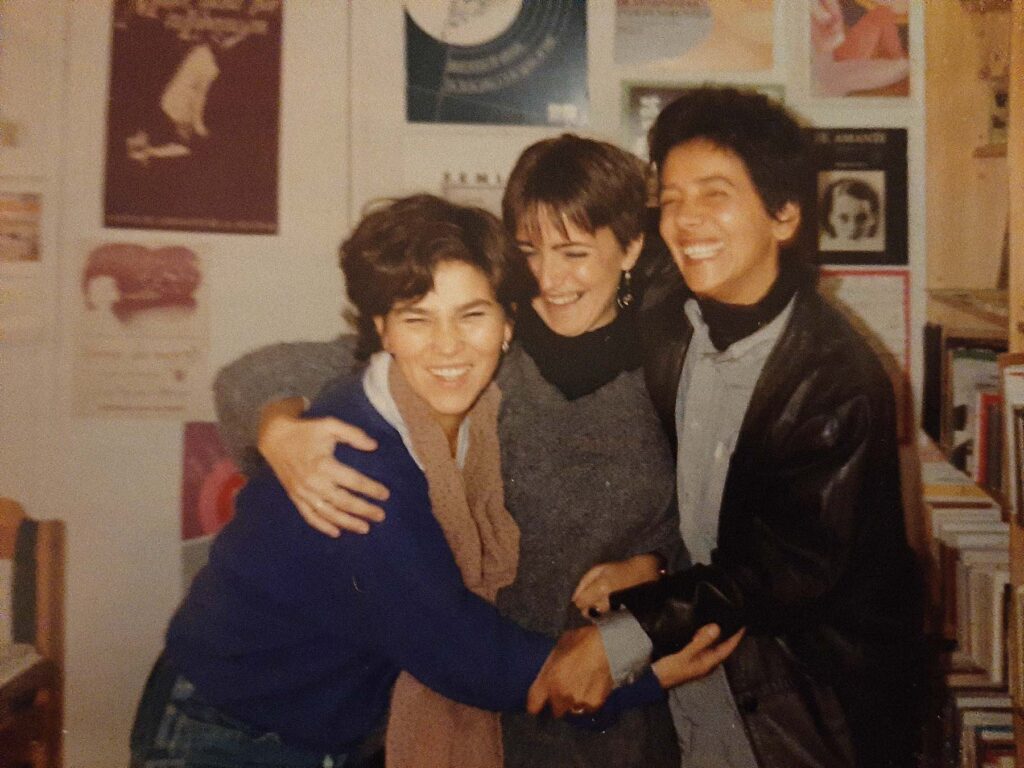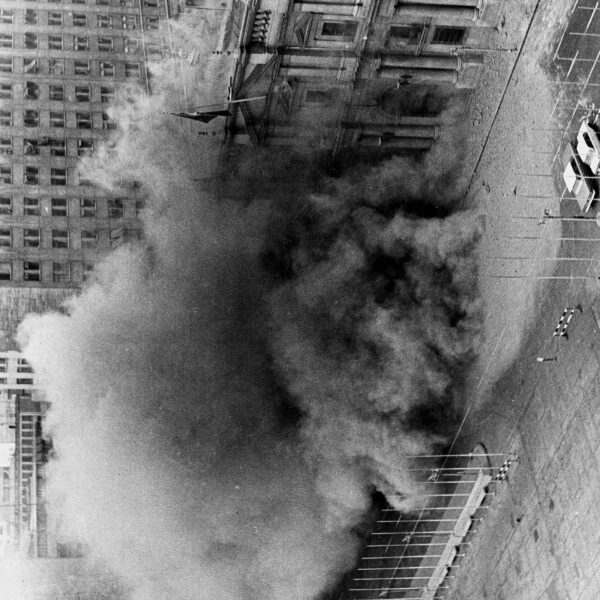The military coup that toppled Chile’s democratic socialist government and installed Augusto Pinochet 50 years ago has shaped much of Western professor Verónica Schild’s life.
The 17-year dictatorship that followed was marked by executions, disappearances and torture of civilians—the scars of which are still seared across the fabric of the country.

Verónica Schild (centre) with friends in 1987, during her first trip back to Chile after fleeing the country as a teenager in 1971.
Schild left Chile with her mother two years before then-president Salvador Allende was overthrown in September 1973. The coup still had a powerful impact. “I was deeply driven and shaped by the military coup in Chile,” she says.
“My professional, intellectual and academic interests have been shaped by my need to understand what happened. That is the fundamental question—how was it possible?—that eventually drove me back.”
Schild, today a political science professor emeritus, shares that question with millions of Chileans who survived Pinochet’s rule, losing family and friends to the regime’s violence.
Western alum Rector Rosa Devés, PhD’78, the first woman to lead the Universidad de Chile, or University of Chile, knows the fear that dominated those years. After receiving her biochemistry degree from the University of Chile, Devés and her husband, a doctor, left the country. Though they weren’t compelled to leave Chile, the couple knew the risks of staying. They came to Canada in 1974, choosing Western to pursue further education.
Devés obtained a PhD in biochemistry at Western in 1978 before pursuing postdoctoral studies at the University of Southern California and later returning to Chile.
Back at home, the military had infiltrated the University of Chile, even appointing active members of the armed forces as rectors to helm the institution between 1973 and 1987. Pinochet targeted the university, Devés says. She witnessed assaults on campus buildings as heavily armed military troops threw tear gas bombs, violently arrested students and destroyed laboratory equipment.
“The dictatorship really tried to destroy the University of Chile. They wanted to reduce the intellectual power of the university because of its commitment to democracy and to the country.

Verónica Schild, Western political science professor emeritus
The search plan
and hopes for closure
Fifty years later, the current Chilean government—led by Gabriel Boric—has promised to dedicate resources to finding those killed and disappeared under Pinochet—announcing the Plan Nacional de Busqueda, or national search plan—to offer closure and reparations for the families of the estimated 1,469 who have never been found. The University of Chile also threw its support behind the search when it was announced in August 2023, with Devés pledging to commit “all its academic capabilities relevant to the clarification of the truths that still remain hidden.”
The University of Chile has rallied under the theme of “Education for Democracy,” with a year-long commemoration to mark the five decades since Pinochet’s takeover ended democratic rule.
The plan is a huge milestone in Chile, where the state has never accepted responsibility for finding Pinochet’s victims, despite documentation in two separate national commission reports. Families of the missing and human rights organizations have taken matters into their own hands. “We value very much—and not just at the university, but in Chile—this public voice and commitment,” Devés says.
As for her institution, there was no question about whether to participate. “It is part of our ethos,” she says. The university is finalizing its collaboration agreement with the government, offering expertise in a variety of areas, from digitizing historical materials to designing human rights training courses.
Interdisciplinary knowledge across the university—from both faculty and students—will help develop Chile’s national search plan. That includes a referral agreement to provide psychological and dental care and occupational therapy for victims and their families, creating an internship program for social science students to analyze research documents and auditing the list of people who disappeared.
Remains of only 307 disappeared people have ever been found and returned to their families, despite 1,469 victims of forced disappearance recognized by the state. National reports identified 40,000 victims of other human rights abuses, such as political imprisonment and torture, during Pinochet’s reign.
Devés notes that decades of searching by grassroots organizations has laid a foundation for the work to come.She presented a new award, Medalla Derechos Humanos y Democracia (Human Rights and Democracy Medal) to Alicia Lira, president of Agrupación de Familiares de Ejecutados Políticos, the association representing families of politically executed persons, in an emotional ceremony last fall. “We wanted to make it very clear that the work the families have been doing all through these 50 years is extremely important. They haven’t got all the attention they deserved,” Devés says.
The devastation of
a brutal regime
Schild recalled reading in the newspaper about the deaths of those she knew. “Some were horrendous, like the killing of my teacher Lumi Videla. I read in The Washington Post that a woman had been tortured to death and her body tossed into the Italian embassy,” Schild recalls. “I only learned much later that my friend Maria Isabel Beltrán was among the disappeared. I could only bring myself to visit her memorial at the former torture centre, Villa Grimaldi, years later in 2017.”
Lingering unanswered questions prompted Schild to return to Chile in 1986, the first of what would become many trips home, this time as a Canadian academic. She worked with low-income women’s groups and grassroots organizations serving poor neighbourhoods—research she describes as “discovering the other Chile,” compared to her comfortable middle-class upbringing before leaving as a teenager.
“Poor people experienced relentless forms of repression and brutality, as I would learn,” Schild says. But she stresses the women with whom she worked had historically been on the losing end in Chilean society. For them, the Allende government had brought improvements and hopes for a more just life.
Thousands of Chileans were lost to the Pinochet regime known for its brutality and for “disappearing” people as a tool of political suppression and a means to stoke fear. “For more than three decades of democratically elected governments, there has been a real foot-dragging on the question of finding the bodies of the disappeared and coming to terms with what actually happened to offer some sense of closure to people. This is a fundamental move for a society,” Schild says.
The future and the
shadow of revisionism
Right-wing populist politics are on the rise, not just in Chile. There, it has made for a painful grappling with history. “We now have a peculiar resurgence worldwide, but also manifested in Chile, of an extreme right. In Chile it has led to minimizing and justifying what happened,” Schild says.
Some claim the coup and subsequent violence under Pinochet has been exaggerated, a stance that has infuriated victims’ families and many other Chileans. One far-right congresswoman has gone so far as to describe the widely documented use of sexual violence as a method of torture during the dictatorship as “urban legend.”
“We are now seeing some voices that somehow try to justify the coup in parliament, in congress,” Devés says. “This is quite new and worrying. It devalues democracy.”
Schild called for a rewriting of the history curriculum taught to Chilean students, noting no government has tackled that necessary step. “It is like our own gaps (in Canadian classrooms), the way in which we’ve minimized, until recently, the treatment of Indigenous peoples as part of the creation of the modern state. There has been an official silence about this.”
There are economic and institutional structures from the dictatorship that feed into today’s conflicts, she adds. “It was a political vehicle for the Chilean economic elite to impose their vision of a free, unregulated market society. And as we know today, in the context of the Cold War, they were widely supported by the United States and their allies. Newly declassified information reveals how even Nazi criminals were involved in training and executing the plans to rid Chile of the ‘internal enemy,’” Schild says. “The last three decades of democratic rule have left a totally privatized life untouched, from health to education, social security and including the most privatized water system in the world.”
Canadian investors are beneficiaries of privatized social goods, too, Schild noted, stressing their overwhelming and controversial presence in mining.
“As a Chilean-Canadian, after 50 years, I feel we have to come clean about Canada’s own situation and creeping privatizations. There are lessons here,” she says. She believes Devés’s public commitment provides a powerful example of the importance of universities in society.
“Someone like Rosa Devés reminds us about the role of public universities, which is to contribute to the public good, and to the shaping and forming of critical citizens,” Schild says. The day Chile’s national search plan was announced, Devés concluded her speech by reciting a poem written by María Cristina López Stewart, a history student at the university, just before she disappeared in 1974.
It’s the stories of López and her classmates—and so many other innocent Chileans—that drive the work ahead, Devés says.
“In honour of María Cristina, her companions, their families, we will search for them and honour them, until we return the soul to our country, and fill the voids and silences with new hope.”
